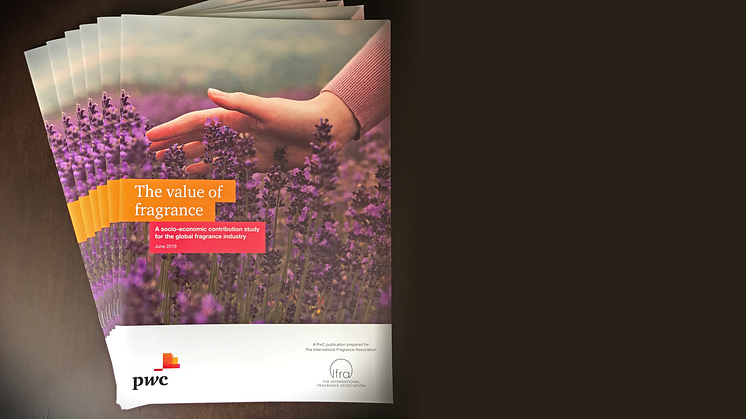
Press release -
Fragrance makes the difference: new study highlights social and economic value of fragrance industry
Fragrance boosts the value of consumer goods such as perfumes, cosmetics and cleaning products by up to ten times, according to a global report published today.
‘The Value of Fragrance’ – a study conducted by professional services firm PwC on behalf of The International Fragrance Association (IFRA) – shows that the manufacturing of fragrance ingredients alone adds €7.2bn to the economy and is responsible for between €48bn and €72bn in Value Added for 25 consumer product categories.
According to the report, the fragrance industry generates sales worth €7.3bn in 2017, contributing to €357bn in global sales generated by consumer product manufacturing and retailing.
The IFRA Chairman, Michael Carlos, said:
“The fragrance industry may be relatively small, but it makes a big impression. This report shows how we add significant economic value to our suppliers and customers, as well as consumers, for whom fragrance is a major factor in purchasing decisions.
But the report also shows our social value: we support 26,000 highly skilled jobs in our industry, and nearly 400,000 jobs among our suppliers in more than 50 countries – helping to sustain and give back to communities around the world. Fragrance has the power to make the difference – in every sense.”
As there is no public definition of the fragrance industry – and where it starts and ends - one of the innovations of the report is a mapping of the global and complex ‘fragrance value chain’.
This chain begins with 3,000 suppliers of natural and synthetic raw materials, from smallholder farms to synthetics manufacturers. It continues with an innovative fragrance industry (represented globally by IFRA) that delivers ingredients for use in fine fragrance, cosmetics and personal care products, and household products and detergents.
Manufacturers of these products use a wide range of retail channels to bring them to consumers, meeting people’s emotional and functional needs.
Martina Bianchini, the President of IFRA, said:
“This report highlights how the fragrance industry is sophisticated, global and innovative. As an industry, we invest eight per cent of net sales in R&D - higher than all sectors in the European Union other than pharmaceuticals and technology hardware.
The Value Added per employee is €135,000 – higher than in the automotive sector and underlining how much talent and creativity we have in our industry.”
The report, which covers Europe, the Middle East and Africa, Asia-Pacific and Latin America, is based on data gathered and analyzed by PwC for the year 2017. To read the report and find out more, go to ifrafragrance.org/value or find us on social media (@ifrafragrance).
Related links
Topics
Categories
The International Fragrance Association, founded in 1973, represents the interests of the fragrance industry worldwide. Comprising eight multinational companies, 21 national associations in four global regions representing hundreds of small and medium-sized fragrance ingredient manufacturers, and seven supporting members, IFRA’s membership covers approximately 90% of the world’s €10bn-a-year fragrance industry.
IFRA has a dual role as an advocate and a regulator. The IFRA Standards, the industry’s flagship self-regulatory program, applies safety management measures based on scientific assessment and the evaluations of an independent Expert Panel. The IFRA Standards demonstrate the responsible approach we take to consumer safety and allow billions of people around the world to safely enjoy the joy of fragrance every day.
Our goal remains to make a difference - in every sense: to create fragrances that bring joy, emotion and color to people's lives; to support prosperity through jobs and scientific advances; and to act responsibility - protecting consumers through our Code of Practice and IFRA Standards, and our respect for our shared environment.




